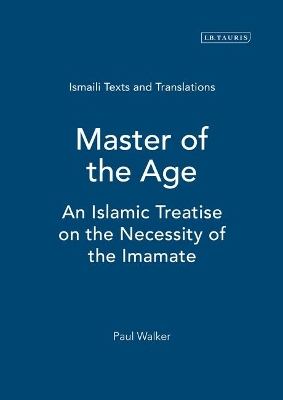Ismaili Texts and Translations
2 total works
Few doctrines in Islam have engendered as much contention and disagreement as those surrounding the imamate, the office of supreme leader of the Muslim community after the death of the Prophet. In the medieval period while the caliphate still existed, rivalry among the claimants to that most lofty position was particularly intense. The early 5th/11th-century Ismaili da'i Hamid al-Din al-Kirmani worked for most of his life in the eastern lands of the Islamic world, principally within the hostile domain of the Abbasid caliphs and the Buyid amirs.At a critical point he was summoned by the da'wa to Egypt where he taught and wrote for several years before returning once again to Iran and Iraq. About 405/1015, just prior to his move from Iraq to Cairo, he composed a treatise he called Lights to Illuminate the Proof of the Imamate (al-Masabih fi ithbat al-imama) in the bold hope of convincing Fakhr al-Mulk, the Shi'i wazir of the Buyids in Baghdad, to abandon the Abbasids and support the Fatimid caliph al-Hakim. For that purpose he produced a long, interconnected series of philosophically sophisticated proofs, all leading logically to the absolute necessity of the imamate.
This work is thus unique both in the precision of its doctrine and in the historical circumstance surrounding its composition. The text appears here in a modern critical edition of the Arabic original with a complete translation, introduction and notes.
This work is thus unique both in the precision of its doctrine and in the historical circumstance surrounding its composition. The text appears here in a modern critical edition of the Arabic original with a complete translation, introduction and notes.
v. 10
The Fatimid empire was a highly sophisticated and cosmopolitan regime that flourished from the beginning of the 10th to the end of the 12th century. Under the enlightened rule of the Fatimid Caliphs, Cairo was founded as the nucleus of an imperium that extended from Arabia in the east to present-day Morocco in the west. Dynamic rulers like the the fourth caliph al-Mu'izz (who conquered Egypt and founded his new capital there) were remarkable not only for their extensive conquests but also for combining secular with religious legitimacy. As living imams of the Ismaili branch of Shi'ism, they exercised authority over both spiritual and secular domains. The sacred dimension of their mandate was manifested most powerfully twice a year, when the imam-Caliphs personally delivered sermons, or khutbas, to their subjects, to co-incide with the great feasts and festivals of fast-breaking and sacrifice.While few of these sermons have survived, those that have endured vividly evoke both of the atmosphere of the occasion and the words uttered on it.
Paul E Walker here provides unique access to these orations by presenting the Arabic original and a complete English translation of all the khutbas now extant. He also offers a history of the festival sermons and explores their key themes and rhetorical strategies.
Paul E Walker here provides unique access to these orations by presenting the Arabic original and a complete English translation of all the khutbas now extant. He also offers a history of the festival sermons and explores their key themes and rhetorical strategies.

